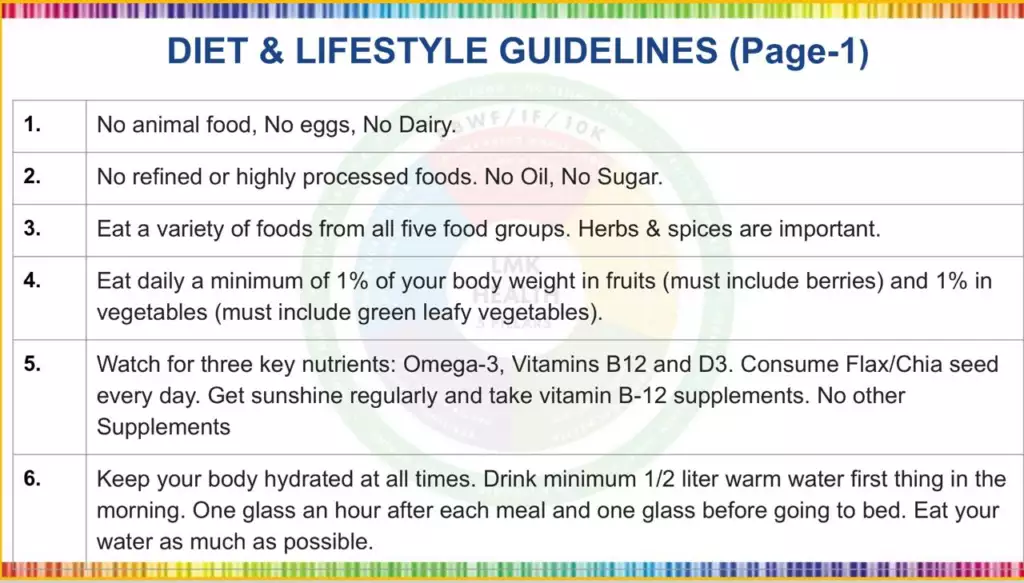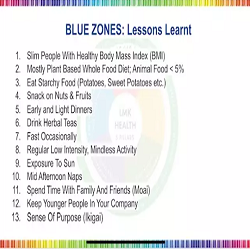April 16, 2024, 9:00 AM IST
The most important of the five pillars of health is food. However, it’s not just about what we eat; it also matters when we eat, how we eat, and what we do to our food before eating. My experience with 200,000 members has shown that a plant-based whole-food (PBWF) diet is optimal for humans. As we discuss the diet and lifestyle changes needed to treat chronic diseases, we must prioritize the bigger picture. Our goal is to significantly improve one’s health from its current state and to ideally eliminate the need for medications related to lifestyle diseases. My focus is on providing instructions that are simple and easy to remember. Here are my dietary recommendations:
(1) Avoid animal foods
No meat, fish, eggs, dairy, or dairy-based products such as yogurt, cheese, and ghee. Here are the reasons for this recommendation:
-Animal foods are rich in protein. As discussed in my earlier blog (February 11), excess protein must be converted into fat and nitrogen by the liver, then into ammonia and uric acid, causing the liver and kidneys to work harder, potentially leading to the need for dialysis and transplants in later years.
-Animal protein includes IGF-1, a hormone that promotes rapid cell growth. For example, a newborn calf weighing 50 pounds can grow tenfold to become a 500-pound bull. While human cells cannot grow that fast due to genetic modulation, cancer cells can thrive in the presence of IGF-1.
A metaphor I use is that while a lawn fed with potent fertilizer cannot grow faster, the weeds within it can. Similarly, tiny cancer cells in our body, common in most civilized populations, can grow rapidly due to IGF-1, thereby promoting cancer.
-Animal foods lack fiber, which is essential for feeding the microbes in our colon, potentially leading to a leaky gut and autoimmune diseases.
-Animal foods are inflammatory and can cause atherosclerosis in our blood vessels, leading to various heart diseases.
-The fat in animal food is mostly saturated fat, which is detrimental to cardiac health.
(2) Avoid refined foods
-Refined foods such as oils, sugar, and white flour are devoid of fiber, moving slowly through the intestines, leading to full absorption of macronutrients and leaving little for the microbes residing in the colon. This can cause the microbes to consume the mucosal layer that protects the internal lining of the colon, leading to a leaky gut and autoimmune diseases.
-Refined foods are quickly absorbed, overburdening our liver. This can lead to the formation of unwanted fat in the liver (causing fatty liver and NAFLD), visceral organs (visceral fat), and between muscle cells (intramyocellular lipids). Intramyocellular lipids block insulin receptors in our muscle cells, causing insulin resistance, a precursor to type-2 diabetes.
(3) Avoid ultra processed foods
Ultra-processed foods, like high fructose corn syrup (HFCS), used as a sweetener in many processed foods, are devoid of fiber and contribute to a leaky gut and autoimmune diseases. Additionally, they contain many chemicals labeled as Generally Recognized as Safe (GRAS), yet they are not truly safe and cause numerous health issues. For instance, hydrogenated vegetable shortenings sold as margarine, and other products like Dalda and Crisco, have been found to be harmful and banned in many countries.
(4) Eat from all five food groups
The five food groups are fruits, vegetables, beans & legumes, grains, and nuts & seeds. Regular consumption of herbs & spices is also highly recommended. Aim to consume one-fifth of your daily caloric intake from each food group, though this can vary daily. To accelerate weight loss, consume only the minimum recommended amount from the Nuts & Seeds group. Aim to eat at least 1% of your body weight in fruits (including berries) and vegetables (half from green leafy vegetables) daily.
(5) Five nutrients require special attention
Monitor these key nutrients closely: Omega-3, vitamins D-3, B-12, and K-2, and iodine. To ensure adequate Omega-3 intake, consume one tablespoon of ground flaxseed or chia seeds, along with a few walnuts each day. Include a variety of seeds and nuts; try to eat one Brazil nut each week as it is rich in selenium and also include pumpkin seeds. Take a vitamin B-12 supplement—either 50-100 mcg daily or 2,000 mcg weekly. Vitamin D-3 is best obtained from sun exposure. Only take a D-3 supplement if you are deficient and do not get much sun exposure. For vitamin K2 consume some fermented foods and also sauerkraut. It also helps to consume some sea greens like seaweed and algae as they are rich in iodine, Omega-3 and can provide some vitamin D and B12. Some examples are wakame salad, nori and kelp flakes.
(6) Keep your body hydrated
Drink a minimum of half a liter of warm water first thing in the morning before brushing your teeth, a glass an hour after dinner, and another glass before going to bed.
Rest of the day, “eat” your water by consuming fresh fruits and vegetables rich in water content.
The first six of my Daily Dozen recommendations relate to food and are listed below.
No other restrictions are there. Enjoy a variety of foods, including those you like and some you may not. Eat as much as you like but never beyond the point of liking. No portion control is necessary. After a year on the PBWF/IF/10K program (PBWF diet with 16:8 Intermittent Fasting and 10,000 steps daily), you should be able to rely on your body’s instincts to choose food and portion sizes.
Another rule of thumb is that at least half of your caloric intake should come from uncooked foods. Following these guidelines should naturally lead to this balance. Consider including sprouted beans to increase your intake of raw foods.
How to cook without oil?
Many Indians feel at a loss because they aren’t sure how to cook vegetables without using ghee or oil. Here are a few tips:
1. Sauté onions in a few tablespoons of water or vegetable stock.
2. Use spices that have been dry-roasted separately.
3. Incorporate nut butters like peanut or cashew butter.
4. Continue with your normal cooking process.
5. Use air fryers instead of deep frying, or opt for baking.
6. Add avocados to dough for making rotis or stuffed parathas. Avocados contain 80% fat.
To Read this article on Times of India click here



Share and get 15% off!
Simply share this product on one of the following social networks and you will unlock 15% off!